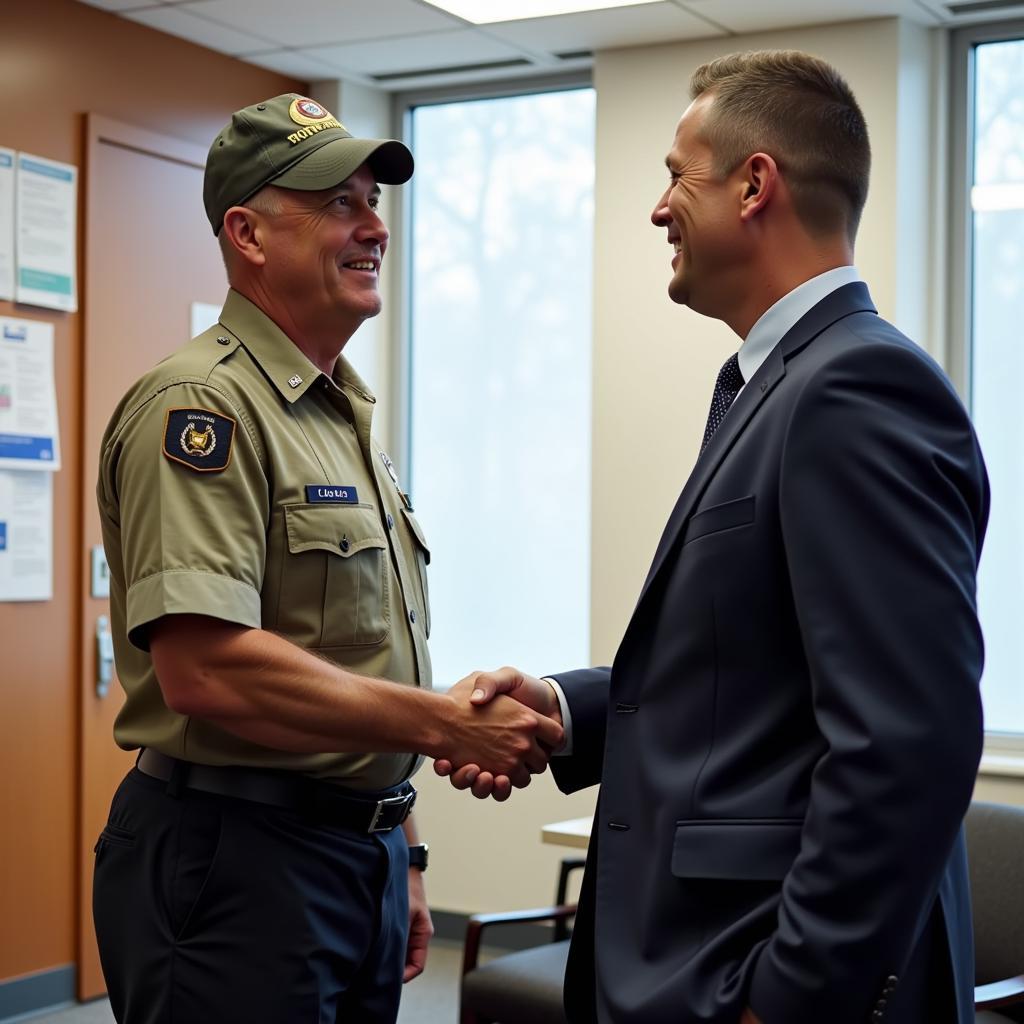Transitioning from the structured military environment to civilian life can feel daunting, especially when navigating the job market without a college degree. While a degree can be advantageous, it’s certainly not a requirement for success. Many rewarding jobs value the skills and experience gained during military service. This guide explores various career paths and resources to help you launch a successful civilian career after the military, even without a degree.
 Veteran Working on Computer
Veteran Working on Computer
Highlighting Your Military Skills
Before diving into specific jobs, it’s essential to recognize the transferable skills gained during your service. Employers highly value qualities such as:
- Leadership: Leading teams, taking initiative, and making decisions under pressure are invaluable assets.
- Teamwork: The military instills a strong sense of collaboration and the ability to work effectively within a group.
- Discipline: Veterans are known for their punctuality, strong work ethic, and ability to follow instructions.
- Technical Proficiency: Many military roles involve specialized training and experience with complex systems and technology.
 Veteran Shaking Hands with Civilian
Veteran Shaking Hands with Civilian
When crafting your resume and cover letter, prominently showcase these skills using action verbs and specific examples to illustrate how your military experience aligns with the desired job requirements.
In-Demand Jobs After the Military With No Degree
Let’s explore some promising career fields that often prioritize experience and skills over formal education:
1. Skilled Trades
The skilled trades sector consistently faces a high demand for qualified professionals, offering excellent earning potential and job security. Consider these options:
- Electrician: Military experience with electrical systems translates well to this role.
- Plumber: Strong mechanical aptitude and problem-solving skills are essential for plumbing work.
- HVAC Technician: Installing and maintaining heating, ventilation, and air conditioning systems is a sought-after trade.
- Welder: Precision, attention to detail, and knowledge of safety procedures learned in the military are valuable assets in welding.
2. Transportation and Logistics
Your logistical expertise and experience with transportation systems from your time in the military are highly applicable to these roles:
- Commercial Truck Driver: A career as a truck driver offers independence and opportunities for travel.
- Air Traffic Controller: Though requiring additional certification, your military background in aviation can be a strong foundation.
- Logistics Coordinator: Managing the flow of goods and services aligns well with military logistics experience.
3. Public Safety and Security
Your military training has prepared you for high-pressure situations requiring quick thinking and a commitment to safety:
- Law Enforcement Officer: Your discipline, leadership, and knowledge of security protocols make law enforcement a natural fit.
- Firefighter: Physical fitness, teamwork, and bravery are essential for this demanding yet rewarding career.
- Security Guard: Protecting property and ensuring safety leverages your experience in maintaining order and security.
4. Technology and Information Technology
The ever-evolving tech industry values adaptable individuals with strong problem-solving abilities and technical skills:
- Computer Support Specialist: Providing technical assistance and troubleshooting aligns with experience gained in various military roles.
- Cybersecurity Analyst: Your understanding of security protocols can be applied to protect data and systems from cyber threats.
Resources for Veterans Entering the Workforce
Numerous resources are available to support veterans transitioning into civilian careers:
- U.S. Department of Veterans Affairs (VA): The VA offers career counseling, job placement assistance, and educational benefits.
- Military OneSource: This website provides a wealth of information on employment, education, and other resources for veterans.
- Veteran Job Boards: Websites such as RecruitMilitary, VetJobs, and ClearanceJobs specialize in connecting veterans with employers seeking their skills.
- Professional Networking: Attend job fairs, connect with veterans’ organizations, and leverage online platforms like LinkedIn to expand your network.
Conclusion
Transitioning to a civilian career path after the military without a degree requires strategic planning and effort. By focusing on your transferable skills, exploring in-demand fields, and utilizing available resources, you can successfully navigate the job market. Remember, your military experience is an asset; embrace the skills and knowledge gained during your service to embark on a fulfilling new chapter in your professional life.
FAQ
1. How do I translate my military experience to a civilian resume?
Use action verbs to describe your skills and accomplishments. Quantify your achievements whenever possible (e.g., “Led a team of 10 in completing X project ahead of schedule”).
2. Are there any specific industries that are particularly veteran-friendly?
Government agencies, defense contractors, and companies with a strong military history often have programs and initiatives to support veteran hiring.
3. What are some common challenges veterans face in the civilian job search?
Adapting to a different work culture, translating military jargon into civilian terms, and articulating skills effectively are some common challenges.
Need Assistance?
For personalized support during your job search, contact us at:
- Phone: 0902476650
- Email: [email protected]
- Address: 139 Đ. Võ Văn Kiệt, Hoà Long, Bà Rịa, Bà Rịa – Vũng Tàu, Việt Nam.
Our dedicated team is available 24/7 to assist you with your career transition needs.





